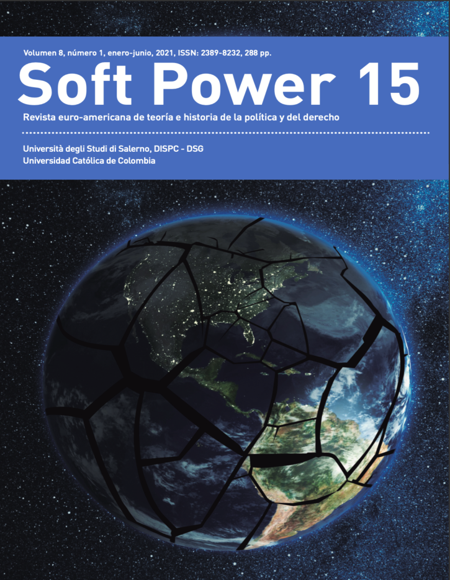
Esta obra está bajo una licencia internacional Creative Commons Atribución-NoComercial 4.0.
Al enviar los artículos para su evaluación, los autores aceptan que transfieren los derechos de publicación a Soft Power. Revista Soft Power para su publicación en cualquier medio. Con el fin de aumentar su visibilidad, los documentos se envían a bases de datos y sistemas de indización, así mismo pueden ser consultados en la página web de la Revista.Resumen
El artículo sostiene que la dimensión espacial de la política existe, y se manifiesta en el pluralismo geopolítico y geoeconómico de los Grandes Estados; que la globalización no implica la uniformidad del mundo; que las dinámicas de las relaciones internacionales, y las de la Unión Europea, también pueden interpretarse y criticarse a través de un pensamiento espacial, concreto pero no determinista.
Palabras clave

Citas
Benton, L. (2010). A Search for Sovereignty. Law and Geography in European Empires
-1900. Cambridge (UK): Cambridge University Press.
Blustein, P. (2019). Schism: China, America and the Fracturing of the Global Trading
System. Montreal: McGill-Queen’s.
Couldry, N., Mejias, U A, The Costs of Connection. How Data Is Colonizing Human Life
and Appropriating It for Capitalism. Stanford: Stanford University Press.
D’Attorre, A. (2020). L’Europa e il ritorno del ‘politico’. Diritto e sovranità nel processo di
integrazione. Torino: Giappichelli.
Davis, B., Lingling, W. (2020) Superpower Showdown: How the Battle between Trump
and Xi Threatens a New Cold War. New York: Harper.
Foucault, M. (1977). Domande a Michel Foucault sulla geografia. In A. Fontana y P. Pasquino
(Eds). Microfisica del potere. Interventi politici (pp. 147-161). Torino: Einaudi,
Galli, C. (2010) Political Spaces and Global War. Minneapolis: Minnesota Univ. Press.
Galli, C. (2018a). Il “Grande Stato” nella politica internazionale. In P. Colombo, D. Palano,
V. E. Parsi (Eds.), La forma dell’interesse. Studi in onore di Lorenzo Ornaghi (pp.
-195). Milano: Vita e Pensiero.
Galli, C. (2018b). Vecchie e nuove “perdite del centro”. Il Pensiero. Rivista di filosofia,
(1), 83-95.
Galli, C. (2019). Sovranità. Bologna: Il Mulino.
Galli, C. (2021). Un mondo di sovrani. In C. Formenti (Ed.), Dopo il neoliberalismo.
Indagine collettiva sul futuro (pp. 83-100). Milano: Meltemi.
Graziano, M. (2019). Geopolitica. Orientarsi nel grande disordine internazionale. Bologna:
Il Mulino.
Jingfeng, S. (2016). Ancora un’indagine sul significato mondiale della Via cinese. In A.
Catone (Ed.), La “Via cinese” (pp. 171-188). Bari: MarxVentuno Edizioni.
Mezzadra, S., Neilson, B. (2019). The Politics of Operations. Excavating Contemporary
Capitalism. Durham and London: Duke University Press.
Mezzadra, S., Neilson, B. (2021). Border as method. Durham: Duke University Press.
Petrone, F. (2021). Globalizzazione, Governance e Istituzioni internazionali. Roma:
Aracne.
Pirenne, H. (1997). Maometto e Carlomagno. Roma-Bari: Laterza.
Sassen, S. (2014). Expulsions: Brutality and Complexity in the Global Economy. Cambridge,
MA.: Harvard University Press.
Schmitt, C. (1941). Völkerrechtliche Grossraumordnung mit Interventionsverbot
für raumfremde Mächte. Ein Beitrag zum Reichsbegriff im Völkerrecht. Berlin:
Deutscher Rechtsverlag.
Schmitt, C. (1950). The Nomos of the Earth in the International Law of the “Jus Publicum
Europaeum”. New York: Telos Press.
Somma, A. (2018). Sovranismi. Stato, popolo e conflitto sociale. Roma: DeriveApprodi.
Visalli, A. (2020). Dipendenza. Capitalismo e transizione multipolare. Milano: Meltemi.
Zheng, Q. (2015). Carl Schmitt, Mao Zedong and the Politics of Transition. London:
Palgrave-MacMillan.










